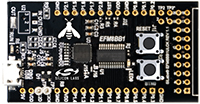By Silicon Labs 199

Silicon Labs' EFM8BB1 low-cost kit is an easy to use yet powerful evaluation tool and development starting point. It contains an integrated debugger and a simple USB micro connection to allow rapid prototyping. The board is fully supported in Simplicity Studio, including code examples for every peripheral and demos to take advantage of the onboard button and LED. The kit also offers a free unlimited Keil compiler license which can be utilized in Simplicity Studio, 8051 IDE, or the PK51 developer's kit. Simply plug the board into the host PC with Simplicity Studio installed and it can be Flashed, debugged, and more.
The EFM8BB1 product family is Silicon Labs' entry into the low-cost microcontroller space without compromises on features or performance. The EFM8BB1 family is AEC-Q100 qualified and features a highly efficient enhanced 8051 pipelined architecture with multiple in-system programmable (ISP) Flash and RAM options, a 12-bit multi-channel analog-to-digital converter (ADC), a precise internal voltage reference, two analog comparators with programmable hysteresis and response time, an extended temperature range (up to +125°C) and a host of communication peripherals (I2C, SPI, UART). In addition, this product family supports three independently configurable enhanced resolution PWM channels and also has built-in hardware kill/safe state capability for overcurrent protection and fault detection. The EFM8BB1 family offers a full lineup of 8-bit MCUs from 2 KB to 8 KB Flash and 256/512 byte RAM in 16-SOIC, 24-QSOP, and 20-QFN packages.
The EFM8BB1 MCUs are an ideal fit for low-memory, low-pin count applications. These MCUs feature a highly efficient, enhanced 8051 pipelined architecture CPU core which executes 70% of the instructions in 1-2 system clock cycles. The EFM8BB1 family takes functional density to the next level by integrating advanced analog, digital and communication peripherals as well as precision oscillators into highly cost-effective 20-pin QFN (3 mm x 3 mm), 24-pin QSOP, and 16-pin SOIC packages. The MCU architecture also features a patented crossbar that enables developers to choose peripherals and pinout placement based on their application needs and layout constraints. This architecture feature means developers can design without worrying about the pre-set limitations and pin conflicts, allowing usage of small pinout packages. That simplifies PCB routing, minimizing PCB layers, and ultimately reducing design time which lowers system costs, and most importantly, optimizes usage of pins. These on-chip features enable developers to minimize external components resulting in significantly reduced solution cost compared to competitive MCUs. The EFM8BB1 family is a perfect fit for a wide range of consumer and industrial applications because of the high level of integration and best-in-class performance.